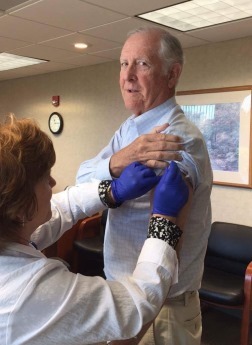“Why do I need a flu shot? I’m perfectly healthy!”
“That’s something I hear all the time, but the best way to stay healthy is to get a flu-vaccine shot every year,” advises Kitty Horton, RN, Director of Infection Prevention at Northern Hospital of Surry County.
This year’s vaccine protects against the main viruses that cause influenza, a serious respiratory disease that can lead to hospitalization. “Each year, numerous hospitalizations occur as a result of the flu and its complications,” says Horton, adding that the Centers for Disease Control and Prevention (CDC) estimated that 310,000 people were hospitalized for flu-related illness during the 2015-2016 flu season.
“Our goal is simple: to prevent people from getting the flu — especially those who are more likely to develop flu-related complications,” explains Horton. Those higher-risk individuals include young children, pregnant women, the elderly, and those with existing chronic medical conditions. “The more people we vaccinate, the less flu that can develop and spread throughout our community,” she says.
In keeping with CDC recommendations, Horton recommends that people get their flu shots before the end of October, if possible. “It’s very hard to predict when flu activity will actually begin,” she says, adding that flu activity in the U.S. most commonly starts in the early-months of fall and then peaks in January or February. “Since it takes up to two weeks after you get the shot for your body to build-up immunity, it’s important to get the shot as soon as possible.”
Getting vaccinated later than October is still beneficial, however, since the flu season may extend well beyond the fall and winter months.
Horton, who got her own flu shot several weeks ago, explains that there are also other preventive measures that people can take to reduce their chance of getting … or giving … the flu. These include staying away from people who are already ill; washing your hands regularly with soap-and-water or an alcohol-based hand-sanitizer to reduce the spread of germs; and, if you are sick, staying home from work or school to prevent spreading the flu to others.
Hospital-based Infection Control Measures
“At this time, we have no seen no confirmed cases of influenza this year,” said Horton, “but when we begin to see a steady increase in the number of influenza cases in our inpatient and outpatient facilities, we will implement additional infection control measures to further protect patients, employees, visitors and the community.” Such measures may include advising families and friends to refrain from visiting patients in the hospital or its Skilled Nursing Facility; advising patients to seek initial treatment for influenza-like illness from their primary-care physician’s office or an Urgent Care Center; advising those with respiratory symptoms who must visit the hospital to don a mask to cover their nose and mouth (such masks are available at all entrances to the hospital); and advising all individuals to sneeze into a tissue or the bend of their arm – not into their hands.
Regional Readiness
Northern Hospital and other local facilities authorized to provide flu shots have received their preliminary allotments of this year’s vaccines. “We encourage all eligible individuals to get their flu shots now,” emphasized Horton, “because the more people we immunize against influenza the fewer cases of flu and its complications we will need to treat.”
It’s important to note that the flu vaccine – which contains “inactivated” (or killed) flu viruses – cannot cause the flu. And, while most people have no negative reaction to the vaccine injection, some may develop minor side-effects such as soreness and redness at the injection site, along with temporary aches. Anyone who suspects they may have an allergy or negative response to the flu vaccine should check with their primary-care doctor before getting vaccinated.
“Getting a flu shot is safe and smart,” says Kitty Horton. “It’s also the best preventive measure we have to help protect yourself and others from getting a very serious disease – one that could lead to complications and, in some instances, death. So, roll up your sleeve to stay safe!”
Getting Your Flu Shot
Flu shots are offered in Mount Airy and its surrounding towns in many locations — including doctor’s offices, clinics, urgent-care centers, hospitals, and even local pharmacies. Vaccines are also available at Northern Family Medicine, located on North Pointe Blvd., in Mount Airy. For more information about the flu or flu vaccines, visit the Centers for Disease Control and Prevention at www.cdc.gov/flu

Bill Woltz, Jr., Chairman of the Northern Hospital Board of Trustees, rolls up his sleeve for Kitty Horton, RN, to administer his flu vaccination.
